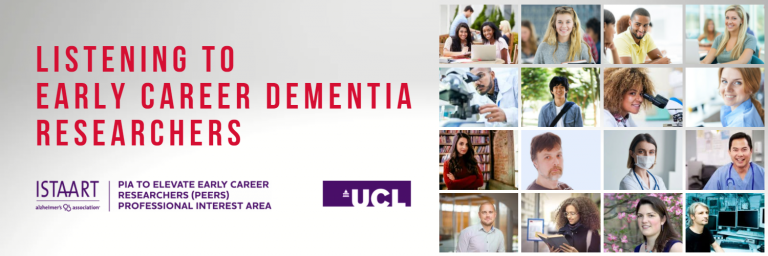International Alzheimer’s Research Society & UCL survey turns spotlight on ECR life and challenges
25 April 2022
Far-reaching international survey of early career researchers (ECRs) reveals feelings on a wide range of topics including job satisfaction, experiences in the workplace, discrimination, publishing, life during the pandemic, conferences, moving and overall challenges

The Alzheimer's Association International Society to Advance Alzheimer's Research and Treatment (ISTAART) Professional Interest Area to Elevate Early Career Researchers (PEERS) and UCL Queen Square Institute of Neurology have published compelling, and sometimes worrisome, new survey results. Listening to Early Career Dementia Researchers Report has unearthed both encouraging and cautionary new insights related to life as an early career dementia researcher.
The voluntary survey was completed by more than 500 ECRs from 42 countries, with the United Kingdom and USA providing 34% of responses, working across all fields of dementia research and discovery – from lab based research, clinicians and those working in care and qualitative research. Two third of those completing the survey were women, and 22% consider themselves as holding an identify which is underrepresented at their institution.
77% of early career dementia researchers are happy in their current role, but 84% agree or strongly agree that “The short-term nature of research contracts and funding is a barrier to making advancements and discoveries in dementia research.” Only 25% believe dementia research is sufficiently funded.
The survey highlights that there is a strong ECR population who are passionate about their work and happy in the field. At the same time, many are considering leaving, and there are significant barriers to remaining within the field. The main barriers to career progression are seen as funding (74%), job availability and security (60%) and work-life balance (54%). When asked if they were thinking of leaving dementia research, 52% responded yes / maybe.
The survey included over 160 questions covering everything from thoughts on careers, health, workplace, discrimination, conferences, and the impact of the pandemic. Of particular concern is the finding that 43% of researchers have experienced mental health issues, affecting their effectiveness at work (74%), confidence (69%) and motivation (66%).
Another significant finding comes on the issue of discrimination. The survey found that 51% of people thought that issues relating to sexism were improving. However, when considering ageism, racism, religion / faith, homophobia, and ableism, the majority are uncertain or feel the issues remain unchanged or have gotten worse.
Further analysis of the results is being conducted, and the ISTAART PEERS Group is now working to provide much-needed support as identified by the initial responses. The Group is working with partners to (a) highlight the survey results, and (b) deliver improvements with the goal of attracting and retaining more early career researchers to consider dementia their chosen area of focus.
It is clear from the results that survey respondents would like to see:
- Increased funding, particularly in areas where there are career bottlenecks, such as Fellowships / Postdoctoral Positions, and in countries where dementia research is not prioritised.
- Improved job security and longer contracts.
- Changes to research culture with more training, personal support and mentoring.
- Additional concerted efforts to address discrimination.
Adam Smith, PEERS Chairperson, Programme Director, UCL Queen Square Institute of Neurology. “The survey results are reassuring in that they highlight how fantastically enthusiastic and dedicated early career researchers are, and how they love their jobs. In particular, they want to make a difference to the lives of people living with dementia now, and make it a disease which can be prevented in the future. However, we have work to do if we want to encourage those researchers to remain within the field and to attract more in the future.”
Dr Maria C. Carrillo, Chief Science Officer, Alzheimer's Association. “Early-career researchers are crucial to the future of Alzheimer's research and treatment. It is the innovative ideas and new approaches from the next generation of researchers that will lead us to understand even more about the biology of Alzheimer’s and dementia, develop new tools for earlier and more accurate diagnoses, and establish novel avenues for treatments."
Martin Rossor, Professor of Clinical Neurology at UCL Queen Square Institute of Neurology & Chairman of the Senate for the German Centre for Neurodegenerative Diseases (DZNE). "This is an important piece of work, bringing attention to the challenges faced by early career researchers across the world. Increasing funding and improving research culture will help ensure we can attract and retain people; this work will help identify how to prioritise and deliver those improvements."
Dr Rosa Sancho, Head of Research, Alzheimer's Research UK. “ECRs play significant roles in delivering the projects that we fund. They are central to creating a rich and diverse research culture and connecting the dementia research field through the networks they form. It is critical that we listen to the needs of ECRs and support career pathways that can otherwise be challenging and vulnerable to loss of talent. Our vision of a world without dementia is only possible through nurturing talented and dedicated ECRs to become future leaders."
Malú Gámez Tansey, Professor of Neuroscience and Neurology at University of Florida & Editor-in-Chief, Nature Partner Journal Parkinson's Disease. "As a female scientist of color, I see my responsibility as a leader who has a voice to give early-stage researchers an opportunity to share their ideas by speaking at conferences. In this way, they can start making an impact from very early on in their scientific training, and network and become connected with others who can help them accomplish whatever career outcomes their hearts desire. To make this happen, I work with allies who believe in the importance of multicultural work and training environments. It is the richness of diverse backgrounds and life experiences that will lead us to solve the most challenging problems facing science this century."
 Close
Close

